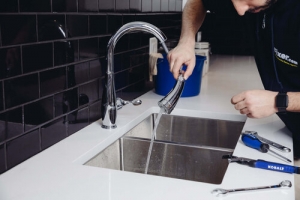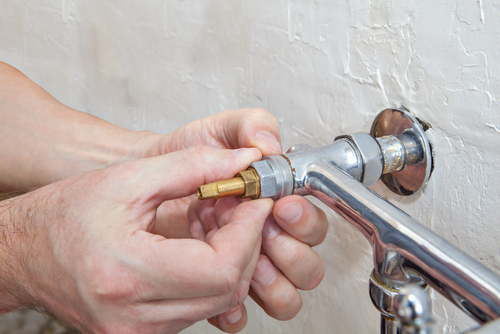An Causes Behind Dealing with a Broken Faucet
An Causes Behind Dealing with a Broken Faucet
Blog Article
We have uncovered the article relating to Why It's Important to Fix Leaky Faucets directly below on the web and think it made perfect sense to talk about it with you here.

Leaking faucets could appear like a minor inconvenience, yet their effect surpasses just the nuisance of the sound. From wasting water to sustaining unnecessary monetary prices and health dangers, overlooking a leaking tap can bring about various repercussions. In this post, we'll explore why it's crucial to address this common home problem quickly and efficiently.
Waste of Water
Ecological Effect
Leaking taps add significantly to water wastage. According to the Environmental Protection Agency (EPA), a single tap trickling at one drip per secondly can squander more than 3,000 gallons of water per year. This not just stress water resources but additionally impacts environments and wild animals based on them.
Step-by-Step Guide to Dealing With a Dripping Tap
Tools Called for
Before trying to take care of a dripping tap, gather the essential tools, consisting of an adjustable wrench, screwdrivers, replacement components (such as washers or cartridges), and plumber's tape.
Usual Faucet Issues and Their Solutions
Recognize the type of faucet and the certain concern causing the drip. Typical troubles include worn-out washing machines, corroded shutoff seats, or defective O-rings. Refer to maker guidelines or online tutorials for step-by-step support on fixings.
Financial Costs
Increased Water Bills
Beyond the environmental effect, trickling taps can blow up water bills substantially. The built up waste gradually equates into higher energy expenditures, which might have been prevented with timely repairs.
Possible Residential Or Commercial Property Damage
Moreover, prolonged dripping can bring about damage to components and surface areas bordering the faucet. Water buildup can create discoloration, deterioration, and even architectural problems if left unattended, causing extra fixing prices.
Wellness Problems
Mold And Mildew and Mildew Development
The consistent visibility of wetness from a leaking tap produces a suitable atmosphere for mold and mildew and mildew development. These fungi not just endanger indoor air high quality but additionally present health threats, especially for individuals with respiratory system conditions or allergic reactions.
Waterborne Illness
Stationary water in dripping faucets can become a breeding place for germs and various other pathogens, boosting the threat of waterborne diseases. Pollutants such as Legionella germs grow in stagnant water, possibly bring about significant ailments when consumed or inhaled.
DIY vs. Specialist Fixing
Benefits and drawbacks of DIY Repair
While some might try to repair a dripping tap themselves, DIY repairs include their own set of obstacles. Without proper expertise and tools, do it yourself attempts can worsen the concern or result in insufficient repair work, lengthening the problem.
Advantages of Working With a Professional Plumber
Employing a specialist plumber makes certain that the underlying cause of the leaking tap is resolved efficiently. Plumbing professionals possess the know-how and tools to detect and fix tap issues efficiently, saving time and reducing the danger of additional damages.
Ecological Obligation
Private Contribution to Conservation
Taking duty for dealing with trickling taps straightens with wider efforts toward water preservation and ecological sustainability. Every individual's activities jointly make a considerable effect on preserving valuable resources.
Sustainable Living Practices
By focusing on timely repair services and adopting water-saving behaviors, individuals contribute to lasting living techniques that benefit both present and future generations.
Safety nets
Routine Maintenance Tips
To stop leaking taps, do routine maintenance such as cleansing aerators, checking for leaks, and replacing damaged parts without delay. Furthermore, take into consideration installing water-saving gadgets or updating to much more reliable components.
Significance of Prompt Fixes
Attending to trickling faucets as soon as they're discovered stops more water wastage and potential damage, ultimately saving both water and money over time.
Effect On Property Value
Perception of Well-Maintained Residential Or Commercial Property
Keeping a property in good condition, consisting of resolving upkeep problems like dripping taps, boosts its viewed value and worth amongst potential buyers or occupants.
Influence on Resale Worth
Residences with properly maintained plumbing fixtures, consisting of faucets, command higher resale worths in the property market. Attending to trickling taps can contribute to a favorable impression throughout residential or commercial property examinations and negotiations.
Verdict
Attending to a trickling faucet exceeds plain benefit; it's a crucial step toward saving water, reducing financial expenses, and guarding health and home. Whether with do it yourself repairs or expert help, doing something about it to deal with dripping taps is a small yet impactful way to promote responsible stewardship of resources and contribute to a much healthier, extra lasting future.
How to Fix a Leaky Faucet: Step-by-Step Repair Guide
A leaky faucet may seem like a simple annoyance, but if it's not fixed promptly, that leak could cost hundreds to potentially thousands. From water damage to mold, mildew, and high water bills, even a tiny leak can be catastrophic if left unattended. Damage like this can even affect the overall value of your home, so it's important to take the right approach for leaky faucet repair. You may need the help of a plumber in some cases, but we've got a few tips you can try on how to fix a leaky faucet before calling the pros.
Four Faucet Types
When you're learning how to fix a leaky faucet, the first step is knowing what kind of faucet you're working with! There are four common types.
Cartridge Faucets
Cartridge faucets come in one- or two-handled varieties. In one-handled cartridge faucets, hot and cold water combines in a single cartridge. In the two-handled versions, hot and cold water are controlled separately and mixed in the faucet.
Ball Faucets
Ball faucets have a single lever you push up and down to adjust the pressure and rotate to change the temperature. A slotted metal ball controls the amount of water allowed into the spout.
Compression Washer Faucets
They're the oldest type of faucet, but they're still used in many homes — especially older ones. Compression faucets have two separate handles that, when turned, raise or lower the washer that seals a water valve. This valve stops water from flowing through the faucet when it is turned off.
Disc Faucets
Disc faucets rarely need to be repaired due to their maintenance-free design. The water flow is controlled by two discs — the upper one raises and lowers against a fixed lower disc, creating a watertight seal. If your disc faucet starts leaking, you may need to replace the seals or clean residue buildup from the inlets.
Fixing a Leaky Faucet
Step 1: Turn Off the Water
Whether you're learning how to fix a leaky bathtub faucet or how to fix a leaky kitchen faucet, always turn off the water supply to your working area when you're fixing a leak. The last thing you want is a flood added to your list of things to fix.
Look for the shutoff valves below your sink or around the tub and turn them clockwise to stop the water flow. If your faucet doesn't have shutoff valves, you may need to turn off the water for the whole house. Check to make sure it's off by turning the faucet on. If nothing comes out, you're ready to start the repair.
Step 2: Take Apart the Faucet
How you disassemble your faucet depends on the type of fixture you have. You can use a flathead screwdriver to remove the caps on top of the handle or handles for cartridge and compression faucets. Inside, you should see handle screws. Unscrew these with a screwdriver to remove the handle.
Disc- and ball-style faucets will typically have an inlet screw near the handle, and removing that will reveal the interior of the faucet.
Detach the Valve Stem
For cartridge- and compression-style faucets, you'll see the inner valve stem or cartridge once you remove the faucet handles. If you have a compression faucet, unscrew the brass valve stem. If you have a cartridge faucet, pull out the cartridge. If your cartridge has been in place for a while, it may require some tools or extra force to remove it due to mineral deposits.
Examine and Replace Parts
Once you've removed the parts, check them out to confirm what needs to be replaced. You may see corroded rubber washers, O-rings, stems, or cartridges. On a ball-style faucet, check the seats and springs for damage.
If you need to repair a leaky disc faucet, check the inlet and seals on the lower disc.
Once you determine what parts must be replaced, visit your local hardware store. Bring the damaged parts with you to ensure you can purchase the correct components to replace them.
Clean Valves and Faucet Cavity
If you've removed a stem or cartridge, you may notice mineral buildup in the faucet's threads. Use white vinegar to clean the valve seat by soaking it for a few minutes, then scrub it away with a soft toothbrush and rinse with warm water. You can also clean the interior of the faucet in the same way.
Reassemble the Faucet
Once your faucet is cleaned and the required parts have been replaced, it's time to reassemble it. Put the pieces back together and slowly turn the water supply back on. Doing this slowly is crucial because too much initial water pressure can damage the new hardware you've just installed.
https://homewarranty.firstam.com/blog/how-to-fix-leaky-faucet

I'm certainly very curious about Should I Repair or Replace a Leaky Faucet? and I'm hoping you liked the new post. So long as you appreciated our page if you please consider to share it. Kudos for being here. Don't hesitate to come by our website back soon.
Report this page